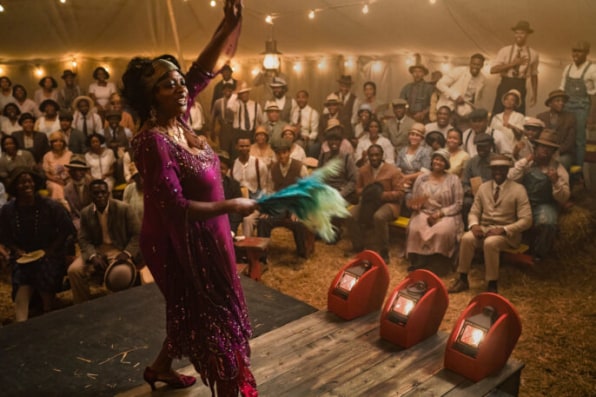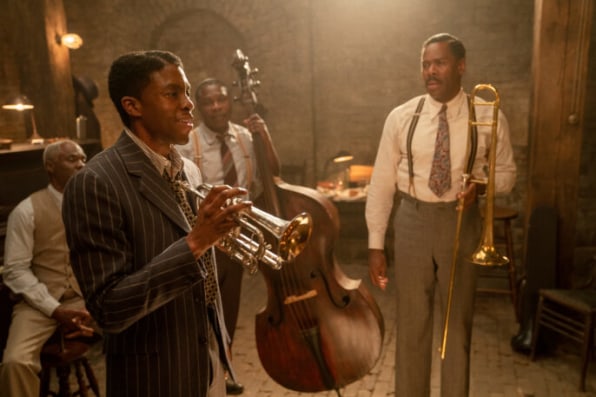I have a deep, dark secret that I’ve been harboring for a while. It’s time to finally get this off my chest.
I . . . disabled all Slack notifications. Months ago. There, I said it.
I’ve had notifications off since sometime in July….
There’s a scant history of posthumous Oscar winners, but Chadwick Boseman’s performance in Netflix’s Ma Rainey’s Black Bottom is a shoo-in for a nomination—and could possibly clinch a win on the power of one scene alone.
Adapted from August Wilson’s 1984 play, Ma Rainey’s Black Bottom stars Boseman as Levee, a hot-tempered trumpet player in legendary blues singer Ma Rainey’s band. A recording session is fraught with mounting friction as Levee’s volatility leads to a devastating incident.
Ma Rainey’s Black Bottom marks Boseman’s final onscreen performance since he passed away from colon cancer in August. Watching his frenetic and searing portrait of a deeply troubled musician serves as a heartbreaking reminder of the magnitude of talent cinema lost.
While Boseman is magnetic throughout the film, there’s one monologue in particular that’s practically gilded with Oscar gold.
After Levee shows an exuberant amount of deference to the white recording studio owner, Levee’s bandmates playfully rib him on how he talks a big game but is “spooked” by the white man. As playful as they were with their jokes, Levee’s temperament rapidly darkens before exploding into a heart-wrenching story explaining his tortured relationship with white men. When he was just eight years old, a gang of white men broke into his home and raped his mother in the kitchen. What followed was a slow-burn revenge plot his father carried out against the perpetrators that brought some justice for the crimes but ultimately ended in his murder.
Boseman masterfully carries the scene with an intensity of barely contained rage, which is only magnified by the fact that it’s a five-minute monologue with little editing.
But, as screenwriter Ruben Santiago-Hudson explains, that scene almost turned out differently.
“I wanted to keep it simple and just deal with Levee and his eyes and the eyes of the other men,” Santiago-Hudson says.
However, he received notes to add more elements to the scene to break up the long shots.
“They felt that in movies, you don’t just sit on one character for three pages,” he says.
He tried to incorporate more people in the scene or even just hands performing various actions relating to Levee’s story as sort of an abstract way to add more beats to the scene. But in the end, Santiago-Hudson pressed for his original idea to keep it as simple as possible, and that’s what made the final cut.
“I said, Trust it: the actor can do it. August’s words can do it. [Director George C. Wolfe’s] direction can do it,” Santiago-Hudson says. “I’m directing when I’m writing. I don’t tell George, ‘You gotta use this camera or that lens.’ But I’ll say, ‘The camera begins to slowly creep in on Levee’s eyes. Occasionally we’ll cut back to the other characters. You see how they’re absorbing the story. His rage grows. His eyes intensify.’”
The most recent actor to earn an Oscar after his passing was Heath Ledger, who won as best supporting actor in 2008 for The Dark Knight. Boseman, who was undergoing surgeries and/or chemotherapy during filming, is equally deserving of the honor.
“There was a transcendence about Chad’s performance, but there needed to be,” said Viola Davis in an interview with The New York Times. “This is a man who’s raging at God, who’s lost even his faith. So [Boseman has] got to sort of go to the edge of hope and death and life in order to make that character work. Of course, you look back on it and see that that’s where he was.”
Dismissive, disingenuous, and dangerous attitudes that women are just little men when it comes to superheroes, science, and concussion management have to be forcefully refuted.
CDProjekt Red’s cyberpunk opus is buggy enough that Sony pulled it from its online store. But parts remain weirdly and undeniably compelling
Surging COVID-19 cases in the Unites States have slowed the pace of auto sales in BlackBerry’s biggest market
In the internet era, porn is everywhere but the company which owns some of the most popular sites is out of sight
No one sings about your nose. But when Santa said, “Won’t you guide my sleigh tonight?” Rudolph became the most famous reindeer in history. But there’s more to Rudolph’s fame than bad weather… Continue reading →
When adapting the works of celebrated playwright August Wilson, you’d be hard-pressed to find someone as studied in the subject as Ruben Santiago-Hudson.
Throughout his 45-year career, Santiago-Hudson has either produced, directed, or acted in all of Wilson’s plays, which has earned him a Tony nomination (Best Direction of a Play for 2017’s production of Jitney) and a win (Best Featured Actor in a Play for 1996’s Seven Guitars). To boot, Santiago-Hudson was also fortunate to call Wilson a friend for more than two decades before the playwright died in 2005.
“Many people feel that I’m one of the preeminent interpreters of his work,” Santiago-Hudson says. “Through our extraordinary conversations, I understood his philosophies and the way that he thought and things that were important to him.”
So it’s little surprise Santiago-Hudson was tapped to adapt Wilson’s 1984 play Ma Rainey’s Black Bottom into a screenplay.
Directed by George C. Wolfe, Ma Rainey’s Black Bottom stars Viola Davis as the titular pioneering blues singer. Over the course of a recording session with her band at the height of her career, tensions rise to a fever pitch as the talented, yet volatile, trumpet player Levee (Chadwick Boseman) becomes a point of contention for everyone, leading to devastating consequences.
Characteristically of Wilson’s work, Ma Rainey’s Black Bottom lays bare the simple joys and complex pains of the Black American experience, which Santiago-Hudson, of course, wanted to amplify to its fullest. He just had to figure out how to do it his way, particularly in the context of Black America today.
“The first August Wilson play that I saw in 1984 was Ma Rainey’s Black Bottom at Cort Theatre on Broadway—and then here it comes full circle,” Santiago-Hudson says. “So instead of the young man that was sitting on the stairs in 1984, sneaking into the theater to watch it, I’m the man that’s empowered to translate that incredible moment in my life to the larger moment in the world’s life.”
“Everything is not sacred”
“One of my rules as a writer is that everything is not sacred, which goes totally against what I think about August’s work, because I think all of it is sacred,” Santiago-Hudson says. “So I had to treat August the way that I treat my own writing. And I had to figure out what story I’m trying to tell.”
What Santiago-Hudson landed on were subtle tweaks to Wilson’s work that empowered the characters and their decisions more so than in the source material.
For example, in the play, Ma’s manager Irvin and the recording studio owner Sturdyvant, two white men, have a conversation about the financial power of Black music. But in the film version, that dialogue lands among Levee and the rest of the band.
“I let the brother have the knowledge,” Santiago-Hudson says. “I empowered Levee with knowledge about the music industry.”

Santiago-Hudson also fleshed out the somewhat bit character Dussie Mae, Ma’s love interest. Part of the tension that mounts throughout the play and film stems from Levee and Dussie Mae’s incessant flirting despite him knowing she’s with Ma. In the play, Levee and Dussie Mae share just a clandestine kiss. However, Santiago-Hudson wanted to dial up the sexual release in the scene in a way that spotlights Dussie Mae’s agency.
“When I was writing it, George was saying, ‘Are they going to . . . .? And I said, ‘Hell yeah, they’re gonna do that.’ I wanted to empower the woman,” Santiago-Hudson says. “I didn’t want Dussie Mae to be some silly little girl that’s following around Ma. I wanted Dussie Mae to be smart and cunning. She doesn’t have a tremendous amount of lines. I empowered her by making her take over in that scene. When she decided to take his little butt, she was taking it.”
Even with Ma, a character who may not seem like she could be more empowered than she is, Santiago-Hudson was deliberate in opening the film showing Ma in full force.
“Ma Rainey comes in on page 48 of 102-page play. You know, when she comes in in my movie? Page one,” Santiago-Hudson says. “The first thing you hear is her moaning. And the next thing you know, we cut into her glory [performing on stage in a tent]. That’s where she was most powerful. Those hundred recordings that she had at Paramount Records between 1923 and 1927 wasn’t where she was most powerful. It was in the tent.”
In a way, those small moments of Black empowerment Santiago-Hudson added underscore one of the play’s themes of how unfairly Black culture is commodified by white power structures in backward deals, if a deal exists at all. It’s something Santiago-Hudson has had to contend with in his own career.
“My integrity is not for sale”
“I want Black folks to take a look at this and see what these white people are doing when they take, take, take from us and turn it into their wealth,” Santiago-Hudson says. “Certain things have no price with me. My integrity is not for sale.”

Santiago-Hudson recalls a time when he was shopping around a miniseries based on the Harlem Renaissance. He pitched it around to a streaming service and a network, and there was definite interest—with the caveat that it would be a movie instead.
“I cannot tell this story in two hours,” Santiago-Hudson says. “Roots has been done twice, but you can’t do the Harlem Renaissance once? You could do [a miniseries] when we were slaves, about how we survived and strived and thrived through all that demolition of our character and the looting and pillaging of our culture, but not when we were kings and queens [in the Harlem Renaissance]?”
“You could see the look in their eyes like, ‘Get him outta here,’” Santiago-Hudson recalls. “If they had a bouncer, you would’ve heard my ass hitting the floor.”
Working on a film like Ma Rainey’s Black Bottom is more than an obligation stemming from how close Santiago-Hudson was to Wilson: It’s the kind of story he wants to help usher in for a new generation. “Those stories that show us as whole, complete human beings with all the frailties and power and magnificence and anger and pathos and pain and laughter that everybody else gets to show.
“There’s no other thing that I love more than telling the whole real stories about my people and all their glory,” Santiago-Hudson says. “Other than my family, it’s the primary thing in my life: telling our stories and making us whole and complete.”
Systems thinking is used among writers, artists, scientists, and, yes, CEOs. When you’re running a company, there are always areas that can be improved, especially as your business grows.
As Donella Meadows explains in her book Thinking in …
Fifty-two percent of employed Americans are working from home today at least at least one day a week, 71% of them as a result of the COVID-19 pandemic. In late October, Fast Company, in conjunction with The Harris Poll, asked 1000 of those folks across…





